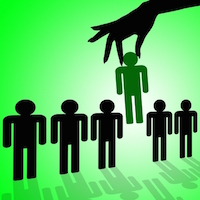What is digital discrimination?
Modern forms of discrimination are subtile and difficult to spot, and, perhaps even not intentional. Indirect discrimination is such. Typically, it is a rule or a procedure that puts certain groups of people into a disadvantage. For example, a requirement to fill in a research grant application form in MS Excel puts into a disadvantage users of Linux or Mac OS. Software platform, of course, is not yet a legally recognised ground for discrimination, but it makes a good example.
 (associative picture)
(associative picture)
Within indirect discrimination, digital discrimination is even more subtle and difficult to spot. Initially, digital discrimination was referring to disadvantages due to having no internet access or not using modern technologies. For example, if call for grant applications is only available on the internet, people who have no internet would be less likely to know about the call and to apply. This is an example of digital redlining. Digital is a mechanism of discrimination here.
The earliest mention of digital discrimination that I can trace is in a book by D. Lyon from 2003.
Lately, digital discrimination has also referred to disadvantages within services provided on the internet. This usage mainly comes from a European project ICUD, their conferences, and collaborators. Digital discrimination in this case is not a mechanism for discrimination, but the area of discrimination, just like a work place could be when analysing equal pay.
Perhaps the most attention and media coverage towards digital discrimination has been captured by a recent case study, which discovers price disadvantages for black people at AirBnB. AirBnB is a market place for holiday rentals. AirBnB got a lot of negative publicity with that, here are just some of the titles:
- Airbnb discrimination? Study finds black hosts charge less on average Los Angeles Times
- Harvard Study Suggests Racial Bias Among Some Airbnb Renters Time
- Racial Discrimination In The Sharing Economy Forbes
- Harvard Study Suggests Airbnb Has A Racism Problem Business Insider
- Airbnb, the home-renting website, has been great for me, but I have misgivings The Guardian
- Study finds black people suffer from discrimination on Airbnb Metro
Curiously, AirBnB does not control prices. So AirBnB does not discriminate here, the crowd does. That is how digital discrimination is subtile - difficult to spot, and even more difficult to prevent.
Update
Two related terms are net neutrality (or data discrimination). Net neutrality is the principle that all the data on the internet should be treated equally. For example, if a provider intentionally slows down peer-to-peer file sharing, that is a violation of net neutrality.
Image courtesy of Stuart Miles at FreeDigitalPhotos.net